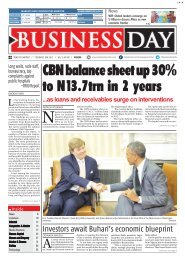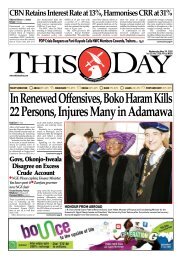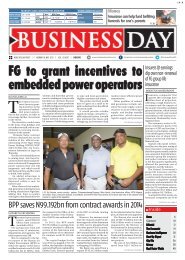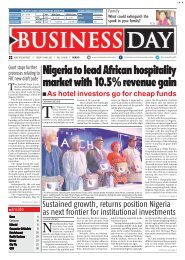Create successful ePaper yourself
Turn your PDF publications into a flip-book with our unique Google optimized e-Paper software.
24<br />
BUSINESSWORLD<br />
THISDAY • WEDNESDAY, MAY 20, 2015<br />
NEWS<br />
NEW TASK FOR SEC AS<br />
UNCLAIMED DIVIDENDS<br />
RISE TO N55 BILLION<br />
Framework.<br />
However, the President of<br />
the Institute of Capital Market<br />
Registrars (ICMR), Mr. Bayo<br />
Olugbemi, during a visit to SEC<br />
last February, said while the<br />
registrars were making their<br />
own efforts to reduce the<br />
unclaimed dividends, there<br />
were some factors affecting<br />
the operations.<br />
He cited poor income<br />
from their activities in the<br />
market and non-passage of the<br />
institute’s bill among others<br />
as some of the factors.<br />
“We are in support of<br />
reduction of fees in the capital<br />
market but what we earn is just<br />
too small and not a reflection<br />
of services we render and<br />
the bill for the institute to be<br />
chartered has not been passed”<br />
Olugbemi said.<br />
FEDERAL<br />
GOVERNMENT’S<br />
DOMESTIC DEBT RISES<br />
TO N610BN<br />
state governments. We estimate<br />
the latter at N2.85trn (bonds<br />
and loans combined) and the<br />
burden for the widest measure<br />
of public debt at 25 per cent<br />
of 2014 GDP.<br />
“This is the worst possible<br />
scenario and assumes, for<br />
example, that AMCON achieves<br />
no more recoveries. The first<br />
quarter increase is generally<br />
the highest of the year due<br />
to the usual fiscal impasse<br />
between the FGN and the<br />
National Assembly. This year<br />
the front-loading of issuance<br />
has been compounded by the<br />
slide in the oil price and the<br />
election campaign.”<br />
They added: “The new<br />
administration may develop<br />
a new borrowing strategy with<br />
different ideas as to ceilings<br />
and the appropriate domestic/<br />
external mix. An alternative<br />
way to view the public debt<br />
stock is as a proportion of that<br />
part of the economy which<br />
generates the revenue to service<br />
it. We would then have a debt<br />
stock/formal sector GDP ratio<br />
and welcome estimates of this<br />
measure.”<br />
Energy Editor<br />
Chika Amanze-Nwachuku<br />
Maritime Editor<br />
John Iwori<br />
AgriBusiness/Industry Editor<br />
Crusoe Osagie<br />
Comms/e-Business Editor<br />
Emma Okonji<br />
Capital Market Editor<br />
Goddy Egene<br />
Senior Correspondent<br />
Raheem Akingbolu (Advertising)<br />
Correspondents<br />
Chinedu Eze (Aviation)<br />
Linda Eroke (Labour)<br />
Eromosele Abiodun (Cap Mkt)<br />
Ejiofor Alike (Energy)<br />
James Emejo (Nation’s Capital)<br />
Obinna Chima (Money Mkt)<br />
Reporters<br />
Nume Ekeghe (Money Market)<br />
Nosa Alekhuogie (AgriBusiness)<br />
Currency-in-circulation Rises to<br />
N1.818trn in March<br />
Obinna Chima<br />
The total amount of currencyin-circulation<br />
in the country<br />
increased year-on-year to<br />
N1.818 trillion at the end of<br />
March 2015, compared with<br />
the N1.623 trillion it was as<br />
at the end of February, 2015.<br />
The Central Bank of Nigeria<br />
(CBN) disclosed this in its<br />
latest money and credit<br />
statistics for March 2015.<br />
The data also showed that<br />
broad money (M2), which<br />
generally is made up of demand<br />
deposits at commercial<br />
banks and monies held in<br />
easily accessible accounts<br />
rose sharply year-on-year<br />
from N16.546 trillion at the<br />
end of February, to N19.142<br />
trillion.<br />
Similarly, narrow money<br />
(M1), which includes all<br />
physical monies such as<br />
coins and currency along with<br />
demand deposits and other<br />
assets held by the central bank<br />
also increased year-on-year<br />
from N6.047 trillion in the<br />
previous month, to N6.994<br />
trillion in March.<br />
Also, banks’ reserves<br />
edged higher to N4.119<br />
trillion in the month under<br />
review, from N4.079 trillion<br />
the previous month, just as<br />
demand deposits, which are<br />
funds held in an account from<br />
which deposited funds can<br />
be withdrawn at any time<br />
without any advance notice<br />
to the depository institution<br />
jumped to N5.223 trillion in<br />
March, compared with the<br />
N4.813 trillion it was in<br />
February. But credit to private<br />
sector reduced slightly yearon-year<br />
to N18.579 trillion in<br />
the month under review, as<br />
against the N18.639 trillion<br />
FTSE, Stanbic IBTC Develop Nigeria<br />
Pension Fund Benchmark<br />
Goddy Egene<br />
FTSE Group, the global index<br />
provider, in collaboration with<br />
Stanbic IBTC Pension Managers<br />
Limited, has developed the<br />
FTSE Nigeria Investable Pension<br />
Fund (IPF) Benchmark. The<br />
new index is the first of its kind<br />
in the region, encapsulating<br />
Nigerian listed companies<br />
while adhering to National<br />
Pension Commission (PenCom)<br />
regulation on investment,<br />
safeguarding good corporate<br />
governance for users.<br />
The index, according FTSE,<br />
has been created as a replicable<br />
index as well as a performance<br />
benchmark.<br />
The index methodology<br />
has been designed to adhere<br />
to PenCom’s regulation on<br />
investment of pension fund<br />
assets, ensuring that a<br />
strong emphasis is placed on<br />
governance and best practice.<br />
The Benchmark constituents<br />
comprised FTSE Frontier Index<br />
Series companies listed on the<br />
Nigerian Stock Exchange, which<br />
are then screened for taxable<br />
profits, dividend, free float,<br />
sector and individual stock<br />
weighting.<br />
Commenting on the index,<br />
Managing Director, Research<br />
& Analytics, FTSE, Jonathan<br />
Cooper said: “As FTSE’s global<br />
presence continues to expand,<br />
we are pleased to launch this<br />
new innovative benchmark featuring<br />
companies from Africa’s<br />
largest economy. Corporate<br />
governance plays a vital role<br />
in all equity markets and is<br />
integral to investor confidence,<br />
leading to significant demand<br />
for benchmarks of this nature.<br />
This is reflected in Stanbic<br />
IBTC Pension Managers’ support<br />
during its development<br />
and immediate adoption on<br />
completion. We look forward<br />
to developing more indices for<br />
this exciting market.”<br />
In his comment, Chief Executive<br />
Officer, Stanbic IBTC Pension<br />
Managers Limited, Demola<br />
Sogunle said “Stanbic IBTC is<br />
committed to the growth and<br />
development of the financial<br />
market. This commitment is<br />
part of the reason why we are<br />
very excited to be part of this<br />
welcome development. The<br />
IPF is necessary for measurement<br />
of the performance of<br />
it attained in February.<br />
Also, quasi money, which<br />
is made up of highly liquid<br />
assets that can easily be<br />
converted to cash increased<br />
from N10.499 trillion in February,<br />
up to N12.148 trillion in<br />
March, while currency outside<br />
banks stood at N1.471 trillion<br />
in March, from N1.233 trillion<br />
the previous month.<br />
Growth in key monetary aggregate<br />
had further decelerated<br />
at the end of February 2015.<br />
Available data had indicated<br />
that interest rates generally<br />
rose in February, while<br />
all other deposit rates of<br />
various maturities had risen<br />
from a range of 3.57–10.79<br />
per cent.<br />
The average prime lending<br />
and maximum lending rates<br />
trended upward in February<br />
as the spread between the<br />
weighted average term deposit<br />
and maximum lending rates<br />
declined by 0.23 percentage<br />
point to 17.08 percentage<br />
points at the end of February<br />
2015.<br />
The Managing Director/<br />
the equity portion of Pension<br />
Funds. It fulfils that need to<br />
have an index that is investable,<br />
transparent and independent.<br />
We believe that it will encourage<br />
more participation in the<br />
market as investors would<br />
be able to track companies<br />
that pension funds typically<br />
invest in.” Also commenting<br />
on the development,mDirector<br />
General, PenCom, Chinelo<br />
Anohu-Amazu, said the<br />
commission is delighted with<br />
this commendable initiative by<br />
FTSE, as it would provide a<br />
good benchmark for Nigerian<br />
Pension Fund Administrators<br />
(PFAs) and PenCom, to better<br />
assess and monitor the performance<br />
of the equities portfolio<br />
of individual pension funds.”<br />
FTSE announced the launch<br />
of the FTSE Frontier Markets<br />
Index Series in September 2014.<br />
The benchmarks covers 26<br />
countries defined as Frontier<br />
by FTSE’s Country Classification<br />
process, and captures the<br />
performance of large, mid and<br />
small cap equity securities from<br />
eligible markets. There are 39<br />
Nigerian companies currently<br />
included in the index.<br />
Chief Executive Officer, Cowry<br />
Asset Management Limited,<br />
Mr. Johnson Chukwu argued<br />
that the priority of the country’s<br />
policy makers is to grow<br />
the economy, then interest rate<br />
should be reduced.<br />
“Given the depth of investable<br />
instruments, rates would<br />
come down and economic activities<br />
would pick up because<br />
companies and individuals<br />
need funding to engage<br />
in economic activities. But<br />
because the cost of funds is<br />
so high, a lot of people cannot<br />
Adibe Emenyonu<br />
in Benin City<br />
With an estimated population<br />
of 179 million people, 65 per<br />
cent of Nigerians still lack<br />
access to any form of banking<br />
facility or service, the Controller,<br />
Benin zonal office of<br />
the Nigeria Deposit Insurance<br />
corporation (NDIC), Mr. Sunday<br />
Oluyemi has said.<br />
Besides, the active rural poor<br />
people, constitute the bulk of<br />
the percentage like the low<br />
income earners arising from<br />
irregular income, distance<br />
to bank branches and the<br />
unemployed.<br />
Oluyemi disclosed this<br />
on Monday at the National<br />
Youth Service Corpse (NYSC)<br />
`Batch A’ 2015 orientation camp<br />
held in Ovia North East Local<br />
Government Area of Edo state.<br />
Oluyemi who relied on<br />
`Enhancing Financial innovation<br />
and Access (EFInA), a United<br />
kingdom (UK) funded Research<br />
Agency, however warned the<br />
NYSC members to be weary<br />
of ‘Wonder Banks’ agents<br />
who may verbally offer them<br />
unrealistic interest rates to<br />
borrow to engage in economic<br />
activities. “We are aware that<br />
this would lead to some level<br />
of inflation, which was why<br />
I said managing an economy<br />
is a balancing act. So, we may<br />
need to accept that increased<br />
level of inflation as a cost of<br />
stimulating economic growth.<br />
If you look at a country like<br />
Brazil, at the height of their<br />
hyperinflation, the inflation<br />
rate was more than 1,000<br />
per cent, but they were also<br />
growing the economy,” he<br />
added.<br />
PROMOTING TRADE<br />
President, Lagos Chamber of Commerce and Industry, Alhaji Remi Bello; Ambassador Extraordinary and Plenipotentiary of the<br />
Democratic Republic of Ethiopia to Nigeria, Mrs. Samia Zekaria Gutu, during her courtesy visit to the Chamber in Lagos...recently<br />
NDIC: 65% of Nigerians<br />
Lack Access to Banking<br />
defraud them.<br />
“About 65 per cent, mainly<br />
people in rural areas and people<br />
with low income do not have<br />
access to banking. But I want<br />
to sound this note of warning<br />
here. Even if they come to you,<br />
don’t fall into their mouth-watery<br />
offer. I fell into such trap in the<br />
past. Don’t patronise wonder<br />
banks”, he declared.<br />
The NDIC state Controller<br />
who dwelled on the topic<br />
“Deposit Insurance System in<br />
Nigeria’’, told the inductees<br />
to imbibe the habit of savings<br />
and urged the public to resist<br />
the temptation of given their<br />
personal bank details via the<br />
internet so as not to fall prey<br />
to internet fraudsters.<br />
He said only banks that have<br />
been insured by NDIC and<br />
the Central Bank of Nigeria<br />
(CBN) are statute-bound to<br />
provide financial safety nets<br />
to protect depositors money<br />
in the unlikely event of bank<br />
distress or liquidation.<br />
Also speaking at the event,<br />
Mrs. Mafoluwafo Williams,<br />
Assistant Director, NYSC,<br />
described the lecture as timely<br />
and sued for its sustenance.
















